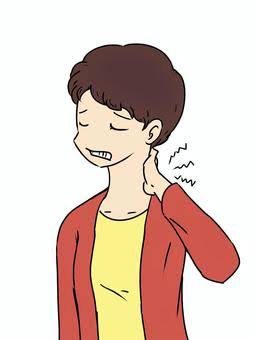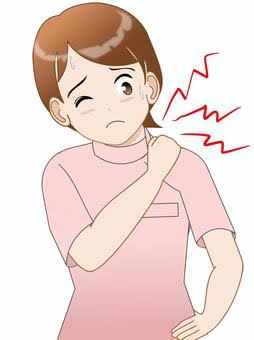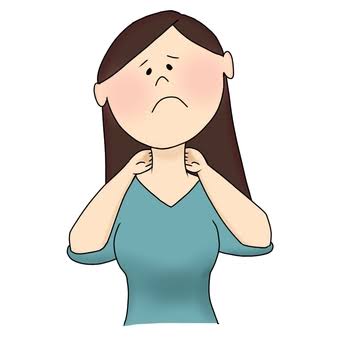Is your neck hurting and keeping you from moving when you wake up? Is it difficult for you to do even the most basic movements because it seems like your neck is stuck? If any of these symptoms apply to you, you may have a stiff neck.
We will examine the definition, causes, symptoms, risk factors, examinations, and general therapy of stiff neck in this extensive guide. We will also discuss homeopathy, a complementary and alternative method of treating a stiff neck.

Understanding Stiff Neck
A stiff neck is a disorder where the neck muscles tighten uncontrollably, resulting in pain and restricted neck movement. It is sometimes referred to as cervical dystonia or torticollis. This stiffness can be extremely unpleasant and either transient or chronic.
The Pathophysiology of Stiff Neck
The involuntary contraction of neck muscles is the main cause of stiff neck. From person to person, the precise aetiology of this muscle dysfunction can differ. But it frequently stems from problems with the neural system, such as the basal ganglia, which regulates muscular contraction.
The Causes of Stiff Neck
Determining the reason for a stiff neck is essential to selecting the appropriate course of action. Several things can lead to stiff neck, such as:
1. Muscle Strain: Excessive usage of the neck muscles, bad posture, or abrupt movements can cause the muscles to become strained and stiff.
2. Cervical Herniated Disc: Pain and stiffness may result from a herniated disc in the cervical spine pressing on nerves.
3. Infections: Bacterial or viral infections occasionally cause inflammation of the neck muscles, which makes them stiff.
4. Trauma or Injury: Accidents or injuries may result in harm to the spine or neck muscles, which can cause stiffness in the neck.
5. Neck Arthritis: This condition can cause stiffness and discomfort by affecting the cervical spine.
6. Stress and Anxiety: Tension in the neck muscles due to emotional stress and anxiety can cause stiffness.
Risk Factors of Stiff Neck
A stiff neck can occur more frequently as a result of specific conditions. Among these risk factors are:
1. Bad Posture: Long-term bad posture can strain neck muscles and raise the possibility of stiffness.
2. Sedentary Lifestyle: Long stretches of time spent sitting still and little exercise can exacerbate stiffness and tension in the muscles.
3. Workplace Factors: Extended computer use or repetitive neck motions are two factors that raise the risk of a stiff neck.
4. Age: The likelihood of experiencing neck-related problems, such as stiffness, seems to rise with age.
Signs and Symptoms of Stiff Neck
Early intervention and successful treatment of a stiff neck depend on being aware of the symptoms and indicators of the condition. Typical signs and symptoms include of:
1. Discomfort: The most common symptoms are neck pain, soreness, and aching.
2. Limited Range of Motion: One of the main symptoms of a stiff neck is difficulty rotating or tilting the head.
3. Muscle Spasms: Sharp pain can be caused by involuntary spasms of the neck muscles.
4. Headaches: Tension headaches can be brought on by a stiff neck.
5. Shoulder Pain: Neck pain may be transferred to the shoulders.
6. Numbness or Tingling: Severe nerve compression may cause the arms to become numb or tingly.
Investigations of Stiff Neck
Medical examinations may be necessary to ascertain the underlying cause and severity of a stiff neck. Among the diagnostic tests that could be performed are:
1. Physical Examination: A medical expert will measure the sensitivity, strength, and range of motion in your neck.
2. Imaging: To see the cervical spine and spot structural problems, X-rays, CT scans, or MRI scans can be performed.
3. Blood Tests: Blood tests can be performed to confirm the existence of an infection if one is suspected.
4. Electromyography (EMG): This test assesses muscular electrical activity and aids in the diagnosis of disorders involving the nerves.
5. Nerve Conduction Studies: These studies can assess how well the affected area’s nerves are functioning.
Differential Diagnosis for Stiff Neck
Effective treatment of different neck disorders requires the ability to distinguish between them. The following illnesses have symptoms similar to a stiff neck:
1. Whiplash: Usually the result of an accident, such as a vehicle crash, whiplash can present with comparable symptoms such as neck pain and restricted range of motion. Nonetheless, it frequently results in harm to the soft tissues and ligaments that surround the neck.
2. Cervical Spondylosis: This cervical spine degenerative disorder is frequently linked to aging. Some symptoms, such as restricted range of motion and neck pain, might coexist with a stiff neck.
3. Muscle Spasms: These quick, excruciating contractions of the muscles can happen on their own. A stiff neck may result from them.
4. Meningitis: Meningitis is a dangerous condition that can result in stiff necks, but it also frequently causes fever, headaches, and mental disturbances.
5. Fibromyalgia: This chronic pain syndrome can cause pain in the musculoskeletal system all throughout, including the neck. It frequently coexists with additional symptoms including exhaustion and irregular sleep patterns.
6. Anxiety and Stress: Excessive levels of anxiety and stress can cause neck muscle tension, which might resemble the signs of a stiff neck.
General Management of Stiff Neck
A combination of medical treatments and at-home care are used to treat stiff necks. Here’s how to treat a stiff neck step-by-step:
Step 1:
Rest- Let your neck rest and heal for a while. Steer clear of activities that could make the stiffness worse.
Step 2:
Ice and Heat- After applying ice packs to the affected area for the first 48 hours, stiff muscles can be relaxed by using warm compresses.
Step 3:
Painkillers- Ibuprofen and other over-the-counter painkillers can help lessen inflammation and relieve discomfort. Consistently take dosages as directed.
Step 4:
Neck Exercises- Mild stretches and exercises for the neck help increase range of motion and relieve tense muscles.
Step 5:
Posture Correction- Be mindful of how you are standing. Make sure your workspace and seating configurations encourage proper posture.
Step 6:
Ergonomics- Maintain a neutral neck position by adjusting your chair, desk, and computer screen.
Step 7:
Physical Treatment- To increase the strength and flexibility of the neck muscles, physical treatment may be advised in some situations.
Step 8:
Homeopathy- Treat stiff neck with homeopathy. Think about homeopathy if you want to treat your stiff neck holistically. Natural ingredients are used to make homeopathic remedies, which are customized to meet the unique needs and symptoms of each patient.
Homeopathy for Stiff Neck
Homeopathy is a natural, all-encompassing method of therapy that concentrates on treating the underlying causes of medical conditions. Homeopathic medicines for stiff necks are chosen in accordance with each patient’s particular symptoms and constitution. The following list of typical homeopathic treatments can be used to relieve stiff neck symptoms:
1. Rhus Toxicodendron: Reduces stiffness in the nape of the neck caused by strain or overuse and made worse by sitting or laying on hard surfaces. Three pills three times a day is the dosage.
2. Cimicifuga: Especially in the morning, this herb is beneficial for relieving stiffness and constriction in the neck, which can also affect the shoulders and back. It is frequently used to treat muscle spasms or tension brought on by emotional stress. Three pills three times a day is the dosage.
3. Guaiacum: Reduces sore shoulders, aches in the nape of the neck, and pain extending from the head. Dosage: Three times a day, tincture or 6C (5–10 drops in water).
4. Lachnanthes: Helpful for neck stiffness and rheumatism, as well as a feeling of dislocation in the nape. Three pills three times a day is the dosage.
5. Arnica Montana: Arnica is a popular treatment for aches and pains in the muscles. When a stiff neck is caused by physical trauma or tension, this remedy may be helpful.
6. Bryonia Alba: Bryonia is beneficial when there is severe stiffness along with neck pain that is exacerbated by movement. Additionally, patients may feel piercing, shooting pain.
7. Gelsemium: If you have a stiff neck and a weak, heavy feeling, gelsemium may be helpful. Additionally, it can treat neck pain brought on by emotional stress or anxiety.
It is crucial to remember that a licensed homeopathy practitioner should choose the right homeopathic medication. To create a treatment plan just for you, they will take into account your medical history, general health, and specific symptoms.
General Prevention of Stiff Neck
It is always preferable to prevent than to cure. Consider taking the following precautions to lessen your chance of getting a stiff neck:
1. Maintain Good Posture: Be mindful of your sitting, standing, and working positions. Make sure the position of your neck is neutral.
2. Remain Active: Frequent exercise can maintain the strength and flexibility of your neck muscles. Include workouts for the neck in your regimen.
3. Ergonomic Workspace: Ensure that your workspace is set up ergonomically to encourage proper posture and lessen neck pain.
4. Stress Management: To avoid the tenseness in your muscles that results from emotional stress, try stress-reduction methods like yoga, meditation, or deep breathing.
5. Prevent Extended Neck Strain: Minimise activities that cause your neck unnecessary strain. If you must perform such tasks, make sure you take regular rest.
6. Sufficient Sleep: Make sure you receive adequate sleep so your muscles can relax and heal.

In Conclusion
Even while having a stiff neck can be uncomfortable and restricting, it can be efficiently controlled with the correct care. You can prevent and treat a stiff neck by being proactive and knowing the causes, symptoms, and available treatments.
With its all-encompassing method, homeopathy provides a customised and natural solution for those with stiff necks. If you are thinking about receiving homeopathic therapy, speak with a licensed homeopathic practitioner for individualised advice on the remedies that will work best for you.
Reach out to us for a Consultation.
This blog is for information purposes. It’s crucial to note that while homeopathy is a centuries-old practice with many adherents worldwide, always consult a qualified homeopath or medical professional before initiating any treatment.
For any queries, reach out to us at contact@homeopathic.ai







